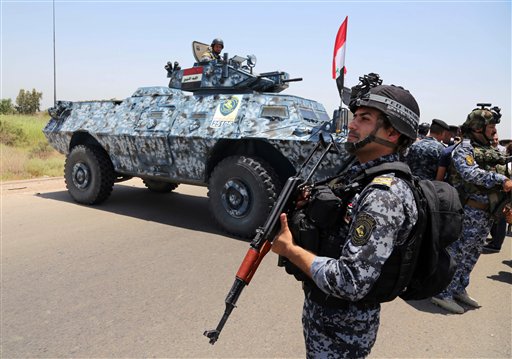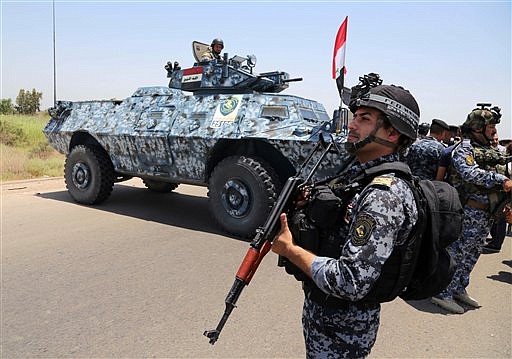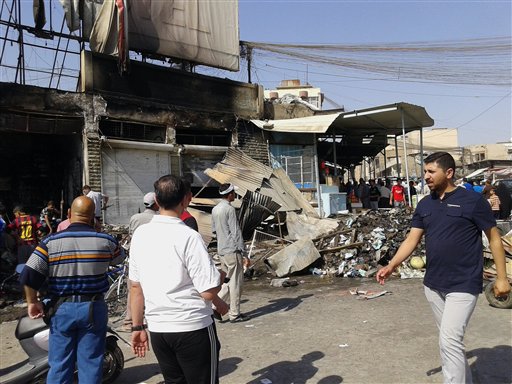 Iraqi federal policemen patrol in Baghdad's Abu Ghraib suburb, Iraq, Saturday, June 28, 2014. Iraqi troops backed by helicopter gunships launched an operation early Saturday aimed at dislodging Sunni militants from the northern city of Tikrit, one of two major urban centers they seized in recent weeks in a dramatic blitz across the country.
Iraqi federal policemen patrol in Baghdad's Abu Ghraib suburb, Iraq, Saturday, June 28, 2014. Iraqi troops backed by helicopter gunships launched an operation early Saturday aimed at dislodging Sunni militants from the northern city of Tikrit, one of two major urban centers they seized in recent weeks in a dramatic blitz across the country.BAGHDAD - The Iraqi government launched its biggest push yet to wrest back ground lost to Sunni militants, as soldiers backed by tanks and helicopter gunships began an offensive Saturday to retake the northern city of Tikrit.
There were conflicting reports as to how far the military advanced in its initial thrust toward Tikrit, the hometown of former dictator Saddam Hussein. Residents said militants were still in control of the city by nightfall, while Iraqi officials said troops had reached the outskirts and even pressed deep into the heart of Tikrit itself.
What was clear, however, was the government's desire to portray the campaign as a significant step forward after two weeks of demoralizing defeats at the hands of insurgents led by the al-Qaida breakaway Islamic State of Iraq and the Levant. The militants' surge across much of northern and western Iraq has thrown the country into its deepest crisis since U.S. troops withdrew in December 2011, and threatens to cleave the nation in three along sectarian and ethnic lines.
Iraq's large, U.S.-trained and equipped military melted away in the face of the militant onslaught, sapping morale and public confidence in its ability to stem the tide, let alone claw back lost turf. If successful, the Tikrit operation could help restore a degree of faith in the security forces -- as well as embattled Prime Minister Nouri al-Maliki, who is fighting to keep his job.
Saturday's fighting began before dawn with helicopter gunships carrying out airstrikes on insurgents who were attacking troops at a university campus on Tikrit's northern outskirts, Iraqi military spokesman Lt. Gen. Qassim al-Moussawi said. The government forces had established a bridgehead on the university's sprawling grounds after being airlifted in the previous day.
Sporadic clashes continued throughout the day at the university. At the same time, several columns of troops pushed north toward Tikrit from Samarra, a city along the banks of the Tigris River and home to an important Shiite shrine, a senior security official said on condition of anonymity because he was not authorized to brief the media.
By sundown, Lt. Gen. Ahmed Abu Ragheef, a commander in the Salahuddin Operational Command, said a column of troops had reached the edge of Tikrit, while another had secured an air base that previously served as a U.S. military facility known as Camp Speicher.
The governor of Salahuddin province, Ahmed Abdullah al-Jabouri, told The Associated Press that troops pushed into Tikrit itself, reaching as far the provincial council building.
However, residents reached by telephone Saturday evening said militants were still in control of Tikrit, a predominantly Sunni city of more than 200,000, and patrolling the city's streets.
They confirmed the clashes around the university, and reported fighting between the Islamic State and Iraqi forces to the southeast of the city as well. Some residents described black smoke rising from a presidential palace complex located along the edge of the Tigris River after army helicopters opened fire on the compound.
They spoke on condition of anonymity out of concern for their safety.
Many locals had already fled the city in anticipation of a government assault, said another Tikrit resident, Muhanad Saif al-Din.
"Tikrit has become a ghost town because a lot of people left over the past 72 hours, fearing random aerial bombardment and possible clashes as the army advances toward the city," Saif al-Din said. "The few people who remain are afraid of possible revenge acts by Shiite militiamen who are accompanying the army. We are peaceful civilians and we do not want to be victims of this struggle."
He said the city has been without power or water since Friday night.
The military also carried out three airstrikes on the insurgent-held city of Mosul early Saturday. Mosul is Iraq's second-largest city, and was the initial target of the Islamic State's offensive in the country.
South of Baghdad, heavy clashes between security forces and Sunni insurgents in the town of Jurf al-Sakhar killed at least 21 troops and dozens of militants, police and hospital officials said on condition of anonymity because they were authorized to brief the media. Jurf al-Sakhar, located some 50 kilometers (30 miles) outside the capital, is part of a predominantly Sunni ribbon that runs just south of Baghdad.
The Islamic State, which already has seized control of vast swaths in northern and eastern Syria, aims to create a state straddling Syria and Iraq governed by Islamic law. In Iraq, the group has formed an alliance of sorts with fellow Islamic militants as well as former members of Saddam's Baath party to fight al-Maliki's Shiite-led government.
The militants have tapped into deep-seated discontent among Iraq's Sunni community with al-Maliki, who has been widely accused of monopolizing power and alienating Sunnis. The prime minister's failure to promote national reconciliation has been blamed for fueling Sunni anger.
The United States and other world powers have pressed al-Maliki to reach out to the country's Sunni and Kurdish minorities and have called for a more inclusive government that can address longstanding grievances.
Al-Maliki is fighting to retain his post, which he has held since 2006, as many former allies drop their support and Iraqis increasingly express doubts about his ability to unify the country. Al-Maliki, however, has shown little inclination publicly to step aside, and instead appears set on a third consecutive term as prime minister after his bloc won the most seats in April elections.
The government received a boost in its fight against the militants with the delivery Saturday in Baghdad of five Russian-made Sukhoi jets. Two Iraqi security officials confirmed arrival of the planes, which Iraq purchased secondhand from Russia.

